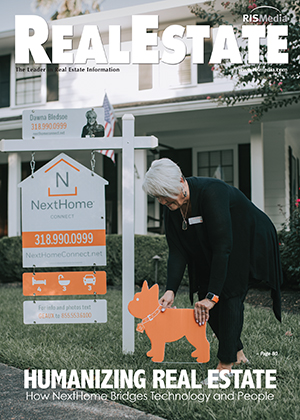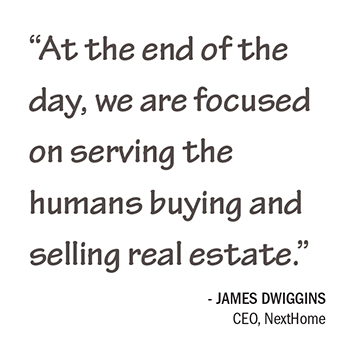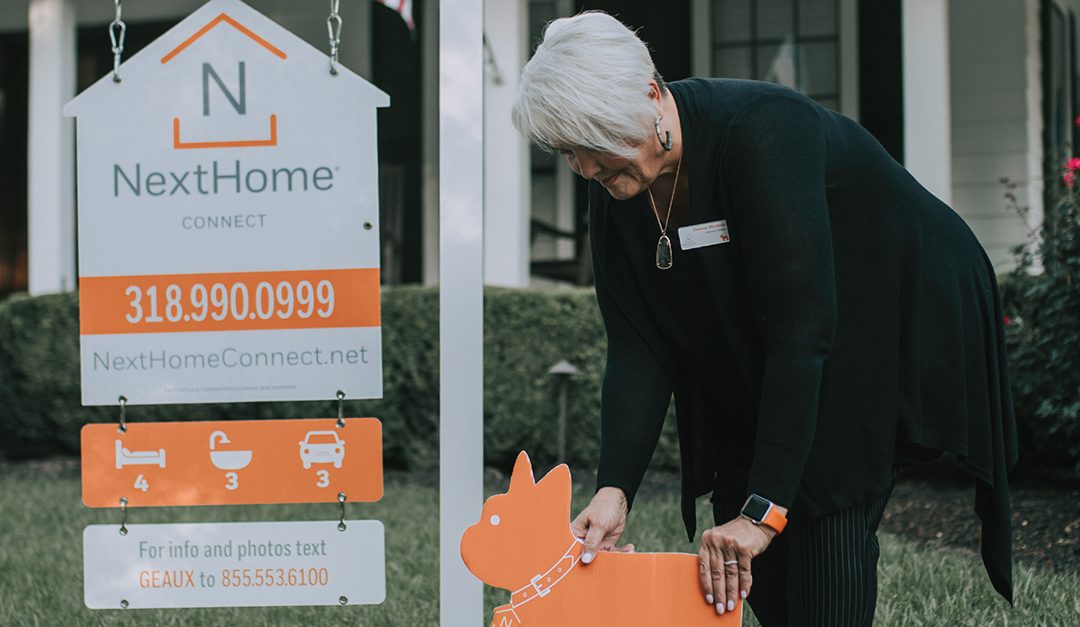 In one short year, the NextHome franchise has made a series of impressive accomplishments, from being named the No. 4 franchise in the country by Franchise Business Review to being on track to close more than 20,000 transactions and $5 billion-$6 billion in sales volume in 2019.
In one short year, the NextHome franchise has made a series of impressive accomplishments, from being named the No. 4 franchise in the country by Franchise Business Review to being on track to close more than 20,000 transactions and $5 billion-$6 billion in sales volume in 2019.
But for NextHome, it’s not about accolades and achievements.
“For us, it’s about creating a professional, collaborative, community-based organization that truly cares about people,” says CEO James Dwiggins.
Here, Dwiggins shares the firm’s unique approach to culture, and explains why NextHome is perfectly poised to withstand the disruptive forces currently shaking the real estate landscape.
Paige Tepping: It’s been about a year since we last spoke. Could you tell us where you are now in terms of size and national footprint?
James Dwiggins: We’re just under five years old and we’ve opened 380 franchise locations across 45 states with more than 3,500 NextHome associates in our network. We have announced at least one new office every week since our franchise launched, and we’re humbled by this record-setting streak. In 2019, we’ll close more than 20,000 transactions worth $5 billion-$6 billion in sales volume.
For such a young company, NextHome has grown at a tremendous rate, especially considering we’ve never acquired any of our marketshare. Our members work hard to be the absolute best in the business, and it shows in the professionalism they put forth each and every day. They don’t settle for mediocrity, and buyers and sellers continue to choose them over others because of it. We couldn’t be prouder of their accomplishments in such a short amount of time.

PT: NextHome has had a lot of national recognition in the past year. Tell us about that.
JD: In February, we were honored to be named the No. 4 franchise in the country by Franchise Business Review. Based on their findings, NextHome also ranked as a Top Services Franchise and a Top Franchise for Women in 2019. Franchise owners from more than 310 brands were asked the same questions to decide these rankings, and to have NextHome place fourth against all other companies the first time we applied for this award was quite a surprise. What we’re most proud of is that this award was determined by honest feedback from our franchisees. It feels good to know our members truly love what we are building together.
Most recently, we were named one of the fastest-growing private companies in America by Inc. 5000. This was truly humbling as it’s a recognition bestowed upon very few companies, such as past winners Patagonia, Oracle, Microsoft, and others.
PT: We’ve heard from multiple sources now that the culture at NextHome is like nothing they’ve ever seen before and that you call yourselves “NextHomies.” What’s the secret?
JD: There is no secret. You have to make a choice on what you’re trying to achieve with your culture early on and never waiver from it. Being a “NextHomie” means you bleed orange, put others before yourself, and deeply care about the buyer and seller experience. The idea-sharing and drive to help each other are the best things about our NextHome members.
We’re fortunate to be a privately-held company, so we don’t have investors or shareholders pushing an agenda that’s only about the bottom line. For us, it’s about creating a professional, collaborative, community-based organization that truly cares about people. The only way to do that is to be selective about who joins.
In our case, it starts with having the right franchise owners, since they are the ones who recruit the agents representing the NextHome brand in each local market. We knew early on that if we brought on the right owners, they would inherently attract the right agents. This is why we often turn away people who inquire about franchising with us. They need to share the same vision in order for our culture to remain strong as we continue to expand nationally—and to ultimately ensure the success of the company.

PT: Everyone is concerned about all the disruption that’s occurring in the industry. Tell us your thoughts, and where you see things in the next 10 years.
JD: There is no question that our industry continues to face massive change and disruption. For too long, mediocracy has reigned supreme in the real estate brokerage business. Hundreds of thousands of agents have a real estate license to help people buy or sell the single biggest asset they own, but have little education, oversight or understanding of what they’re actually doing. In most cases, these agents charge the same fees as tenured professional agents who have done hundreds of transactions in their career. As a whole, our industry charges double what most other countries charge—and provides little extra for it. In 2018, it was estimated that real estate commissions in the U.S. totaled $62 billion. Wall Street and Silicon Valley want a piece of that amount, while buyers and sellers are questioning why they’re paying so much. And while many agents across the country are worth every penny, too many are not. The customer wants and deserves better.
iBuyers like Opendoor have popped onto the scene because they know there is a segment of the market that would take a reduction on the sales price of their home in order to sell it faster. This will certainly be a growing trend nationally, especially amongst “generation now” who don’t view money the same way as their parents. Early estimates are that iBuyers will eventually take up to 20-25 percent of the existing national marketshare in the next 5-10 years.
 And finally, Zillow and realtor.com® control online real estate search with hundreds of millions of unique visitors each month going to their websites versus to brokerages and agents. In addition, they are moving toward a referral fee-based lead distribution program. In time, they will identify the 40,000-80,000 agents across the country who effectively convert online leads and will provide them with all their leads to increase revenue and profitability. Watch for them to eventually tie in mortgage, title and escrow to disrupt those sectors next.
And finally, Zillow and realtor.com® control online real estate search with hundreds of millions of unique visitors each month going to their websites versus to brokerages and agents. In addition, they are moving toward a referral fee-based lead distribution program. In time, they will identify the 40,000-80,000 agents across the country who effectively convert online leads and will provide them with all their leads to increase revenue and profitability. Watch for them to eventually tie in mortgage, title and escrow to disrupt those sectors next.
All of this combined means we’ve arrived at the perfect storm for change and a consolidation of the real estate agent base. Candidly, I think it’s a good thing. The higher the standards become in our industry, the less long-term disruption will occur to the remaining agents because our value proposition will be well understood by buyers and sellers. Real estate agents will be here long term, just a lot less of them offering a very different value proposition than what we do today.
PT: With all this disruption, what are you doing to make sure NextHome agents stay at the center of the real estate transaction in the future?
JD: At the end of the day, we are focused on serving the humans buying and selling real estate. The future is about changing the perceived value of a real estate agent. Instead of homebuyers and sellers only seeing value in their agent for the duration of the transaction, we are currently developing a proprietary system that allows our agents to remain the focal point of everything to do with the home long after the deal has closed.

Currently, most agents receive 30-40 percent of their business via referral, and it’s also how a majority of buyers and sellers choose their agent. However, agents as a whole do not consistently and effectively work their sphere for new business or follow up with past clients. This is mostly because they lack the technology to do it efficiently and have very little to talk about with them once the transaction is complete. They either never follow up with them again, or when they do, it’s with information their clients care little about.
For us, the future is about providing our agents valuable pieces of information about the home, whether it be a recall on an appliance, a notification about the roof warranty expiring or other information the homeowner actually wants to know. This gives our agents a reason to reach out, stay in touch with the homeowner, and nurture that relationship for the 7-10 years they own the property.
The result is more referrals, repeat business and a higher perceived value proposition, which helps our agents justify their commission. We’re calling it the “Lifecycle of Homeownership.”
PT: And finally, what’s on deck for the future of NextHome?
JD: We are continuing to focus our growth in new markets across the U.S. and are beginning to prepare for our international expansion. Since launching NextHome in 2015, we’ve had inquiries from 28 countries to franchise outside the U.S., and we’re looking forward to opening our first international location in late 2020 or early 2021.
Next year will mark the launch of our new luxury brand. We partnered with world-renowned design firm Pentagram to help us create it and the result is truly different than what’s available in the market today. We’ve spent a year studying the luxury market and what great brands do well, and not so well, to make sure we hit a home run upon launch. One significant difference is that the new luxury brand will only be available for use in the top 10 percent of any given market, and only NextHome agents who have become luxury-certified will be able to use it.
And while we already require minimum marketing and advertising standards at NextHome, the luxury brand will be at a whole new level. The brand identity includes all new yard signs, presentation materials, global syndication of properties, and strict minimum marketing and advertising standards on every listing so sellers receive the professionalism and exposure they deserve. This is all part of our long-term strategy for increasing marketshare and expanding globally. It’s truly an exciting time for our company.

For more information, please visit www.nexthome.com.
 Paige Tepping is RISMedia’s managing editor. Email her your real estate news ideas at paige@rismedia.com.
Paige Tepping is RISMedia’s managing editor. Email her your real estate news ideas at paige@rismedia.com.













